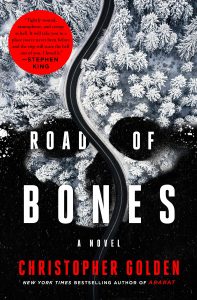The Year in Review 2022 by Gabino Iglesias

I believe this is my third “year in review” essay for Locus, and I’m pretty sure the previous two have started with some version of “It was a great year to be a reader.” Well, 2022 was no different. In fact, I think every year gets better, and that’s a tough thing to do. In any case, I enjoyed a lot of what I read in 2022. Here’s some of the best.
Horror fiction is in spectacular shape, and 2022 had a lot of outstanding novels from established voices as well as emerging writers. Christopher Golden’s Road of Bones was a chilling – literally and metaphorically – read about a group of people trying to survive extreme cold while also fighting against monsters. Paul Tremblay’s The Pallbearers was a tense narrative that was the best (not really about a vampire… or is it?) vampire novel I’ve read in at least half a decade. Alma Katsu, undoubtedly the reigning queen of historical horror, gave us The Fervor, and it was incredibly timely and truly a novel that dug deep into not only the history of Japanese internment camps in the United States but also anti-Asian sentiment in this country. Ronald Malfi’s Black Mouth was also great. The story of a group of friends trying to fight something dark from their past, this one packed enough darkness, weirdness, and magic to keep me glued to the pages despite everything else I was reading at the time. Nat Cassidy’s Mary was truly dark and creepy, and a novel that clearly and unequivocally announced the arrival of a superb new voice in horror. Tim Lebbon’s The Last Storm was like a bizarre version of Mad Max, but it had enough horror elements to comfortably fit under the genre’s banner. Oh, and it had some of the best climate commentary I read this year without being preachy. Josh Malerman’s Daphne was a truly entertaining narrative about an impossible serial killer. I felt like it added a lot to the slasher revival, and it was also a smart story that looked at anxiety in unique ways. Catriona Ward’s Little Eve and Jennifer Thorne’s Lute were tied for the most atmospheric novels of the year. Not surprisingly, both of these books were published by Tor Nightfire, which is quickly becoming one of the best purveyors of dark fiction out there. Also from Tor Nightfire was Thomas Olde Heuvelt’s Echo, a nightmarish story about a mountaineer that I’m still talking about because it managed to deliver a strange combination of tension, atmosphere, gore, and creepiness that I found incredibly satisfying. Isabel Canas’s The Hacienda was also extremely atmospheric and served as an introduction to a great author I hadn’t read before. Iain Reid’s We Spread was as strange and captivating as every other Reid novel I’ve read, and so eerie I’m still thinking about it months after turning the last page. Mónica Ojeda’s Jawbone was as strange and engaging as anything else I read this year, and it also became one of those books I immediately mention when talking about how everyone should be actively seeking out speculative fiction in translation. Jason Rekulak’s Hidden Pictures took the creepy-kid-drawing horror movie cliché and somehow turned it into an exciting, unique novel that also included superb artwork that morphed with the story and turned it into a truly unique reading experience. Naben Ruthnum’s Helpmeet was probably the shortest novella I read this year, but it’s dark, gory, elegant, and relentless, so it deserves a spot here. Last, Michael J. Seidlinger’s Anybody Home? sort of reinvented the home invasion horror narrative and delivered a unique vision that could only have come from Seidlinger’s mind.
 While 2022 was a great year for horror, it was also a great year for science fiction and science fiction-adjacent books. I thoroughly enjoyed Eugen Bacon’s Mage of Fools, Monique Roffey’s The Mermaid of Black Conch, Shäron Moalem & Daniel Kraus’s Wrath, Edward Ashton’s Mickey7, and Blake Crouch’s Upgrade.
While 2022 was a great year for horror, it was also a great year for science fiction and science fiction-adjacent books. I thoroughly enjoyed Eugen Bacon’s Mage of Fools, Monique Roffey’s The Mermaid of Black Conch, Shäron Moalem & Daniel Kraus’s Wrath, Edward Ashton’s Mickey7, and Blake Crouch’s Upgrade.
In terms of collections, which I think don’t get enough love in this type of essay, the year did not disappoint. The best collection I read this year was Tim Lebbon’s All Nightmare Long. Lebbon is already here with a novel, but this collection is something special in terms of the range of the stories, and it shows he’s as good at writing short fiction as he is at writing novels. I also loved Craig Laurance Gidney’s The Nectar of Nightmares and Jeremy Robert Johnson’s All the Wrong Ideas.
There were some novels I loved that don’t fit under the genres mentioned above but still want to mention here: Stephen King’s Fairy Tale, Fuminori Nakamura’s My Annihilation, and Trent Jamieson The Stone Road. They’re all worth your time.
With no MFA student during the first semester and my next novel already turned in, this year I’ll have more time to read. I hope you all find time to put a dent in your TBR pile. Happy 2023 and best of everything to you and yours. Thank you for reading.
Gabino Iglesias is a writer, journalist, professor, and book reviewer living in Austin TX. He is the author of Zero Saints and Coyote Songs and the editor of Both Sides. His work has been nominated to the Bram Stoker and Locus Awards and won the Wonderland Book Award for Best Novel in 2019. His short stories have appeared in a plethora of anthologies and his non-fiction has appeared in the New York Times, the Los Angeles Times, and CrimeReads. His work has been published in five languages, optioned for film, and praised by authors as diverse as Roxane Gay, David Joy, Jerry Stahl, and Meg Gardiner. His reviews appear regularly in places like NPR, Publishers Weekly, the San Francisco Chronicle, Criminal Element, Mystery Tribune, Vol. 1 Brooklyn, the Los Angeles Review of Books, and other print and online venues. He’s been a juror for the Shirley Jackson Awards twice and has judged the PANK Big Book Contest, the Splatterpunk Awards, and the Newfound Prose Prize. He teaches creative writing at Southern New Hampshire University’s online MFA program. You can find him on Twitter at @Gabino_Iglesias.
This review and more like it in the February 2023 issue of Locus.
 While you are here, please take a moment to support Locus with a one-time or recurring donation. We rely on reader donations to keep the magazine and site going, and would like to keep the site paywall free, but WE NEED YOUR FINANCIAL SUPPORT to continue quality coverage of the science fiction and fantasy field.
While you are here, please take a moment to support Locus with a one-time or recurring donation. We rely on reader donations to keep the magazine and site going, and would like to keep the site paywall free, but WE NEED YOUR FINANCIAL SUPPORT to continue quality coverage of the science fiction and fantasy field.
©Locus Magazine. Copyrighted material may not be republished without permission of LSFF.







